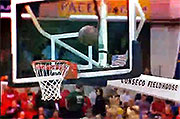
FRIDAY, March 22 (HealthDay News) — Many sports gamblers consider their extensive betting experience and insight into college basketball a slam-dunk for success during the three-week U.S. championship dubbed “March Madness.” But that sense of control over their wagers is an illusion, according to a new study.
“Sports gamblers seem to believe themselves the cleverest of all gamblers,” Professor Pinhas Dannon, of Tel Aviv University in Israel, said in a university news release. “They think that with experience and knowledge — such as players’ statistics, managers’ habits, weather conditions and stadium capacity — they can predict the outcome of a game better than the average person.”
Dannon and a colleague found, however, that these gamblers have no advantage. Not all pathological gamblers fit the same profile, and compulsive sports bettors would benefit from therapy targeted toward their illusions, Dannon said.
The study included 53 professional sports gamblers, 34 people who followed soccer but had never gambled and 78 non-gamblers who knew nothing about soccer.
All the participants were asked to place bets on 16 professional soccer games. The success rate of the professional gamblers was no better than that of the other two groups. The two people with the most successful records (betting correctly on seven out of 16 games) were among the non-gamblers who knew nothing about soccer, according to the study, which was published recently in the journal Psychopathology.
The findings show that the sense of control that encourages many sports gamblers to put down wagers is false, Dannon said.
He noted that psychologists typically place all problem gamblers in the same category, which means that sports gamblers receive standardized treatment. But this won’t work for people who are addicted to sports gambling. Instead, they require therapy that rids them of the illusion of having control over their bets, Dannon said.
This year, the National Collegiate Athletic Association basketball tournament runs from March 19 to April 8. More bets are placed on this tournament than on the Super Bowl.
More information
The National Council on Problem Gambling has more about gambling addiction.

